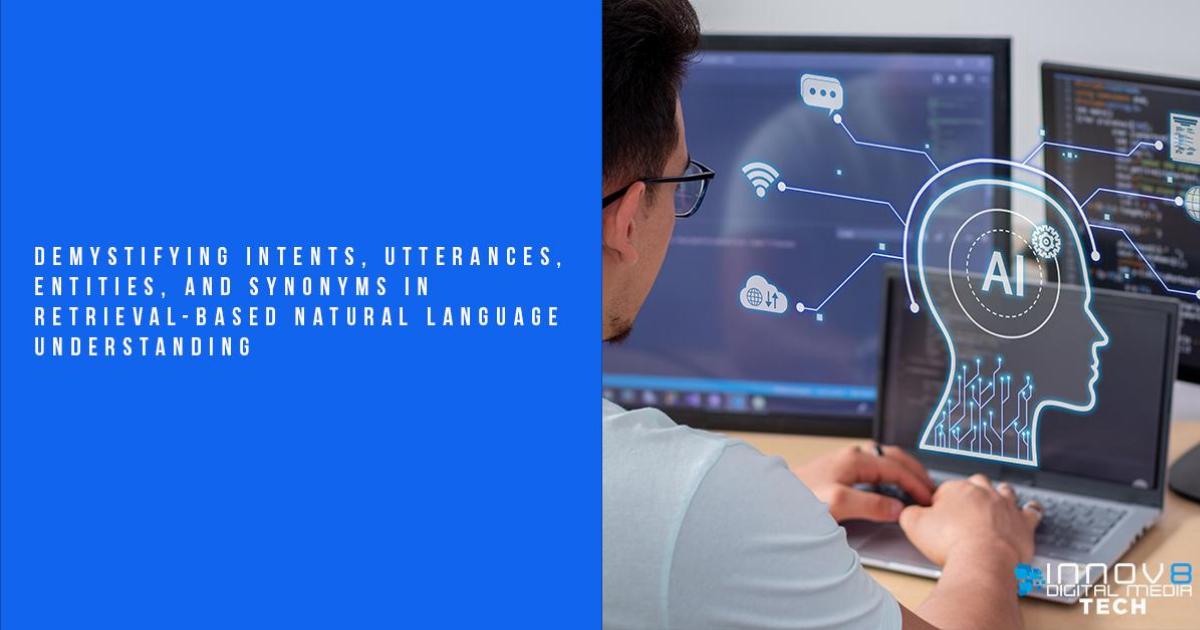















 Adam Keith Milton-Barker 1889 2024-01-27
Adam Keith Milton-Barker 1889 2024-01-27
In natural language understanding (NLU), where machines strive to comprehend human language, concepts like intents, entities, synonyms, and utterances play a pivotal role. These elements form the backbone of retrieval-based NLU systems, enabling machines to decipher and respond to user queries with precision and accuracy. Let's delve into what these components are, why they're crucial, how they facilitate NLU in understanding natural language, and how our IntelliStore intelligent eCommerce solutions use these concepts to provide an intelligent eCommerce experience.
At the core of any NLU system lies the concept of intents. Intents represent the purpose or goal behind a user's input. In simpler terms, intents answer the question: "What does the user want to do?" For instance, in a chatbot designed to assist with flight bookings, a user's query like "Book a flight from New York to London" would be associated with the intent "BookFlight.".

The IntelliStore solutions come with predefined intents ready to assist in training your ISA (Intelligent Store Assistant) model on your products, product categories, brands, and offers. These intents form the backbone of the intelligent service that powers the store. As customers add products, product categories, brands, and offers to their IntelliStore, the system automatically generates intent entities, synonyms, and utterances based on the product information submitted by the customer. This information is then populated into a training dataset that is used to train the ISA model allowing it to have real-time information, answer questions, and carry out actions on behalf of visitors to the store.
In the context of NLU, utterances refer to the various forms of expressions or statements made by users when interacting with a system. These utterances encompass a wide range of linguistic inputs, including sentences, phrases, commands, questions, and more, reflecting the diverse ways in which individuals communicate. Understanding utterances is crucial for NLU systems as they serve as the primary input for analysis and interpretation. NLU systems must be able to decipher the meaning embedded within these utterances to derive the user's intent and extract relevant entities accurately.

When IntelliStore customers populate their store with products, product categories, brands, and offers, pre-defined utterances are generated for each relevant intent, and modified to match the item being added to the store. Customers can modify their utterances and add new ones to help the AI learn and understand more effectively.
Entities complement intents by providing additional context or specifics within the user's input. Entities are the crucial pieces of information extracted from the user's utterance that are relevant to fulfilling the intent. Using the previous example, "New York" and "London" would be extracted as entities representing the departure and destination locations, respectively. In essence, entities answer the question: "What specific details are involved in the user's request?".

The IntelliStore system will again automatically populate the entities based on the product name or the relevant information for the item being added to the store.
Synonyms enrich the understanding of natural language by accounting for variations in how users express the same intent or entity. Language is diverse, and users may convey their requests using different words or phrases while intending the same meaning. Synonyms capture these variations, ensuring that the NLU system can recognize and interpret them accurately. For instance, "NYC" and "New York City" might be synonymous, representing the same location entity.
Enhanced Understanding: By dissecting user queries into intents and entities, NLU systems can grasp the underlying meaning more effectively, leading to precise interpretation and response.
Personalized Interaction: Intents, entities, and synonyms enable NLU systems to tailor responses based on the specific needs and preferences of users, fostering a personalized and engaging interaction.
Improved Accuracy: Synonyms expand the system's vocabulary, allowing it to comprehend a broader range of user inputs accurately, thereby minimizing misunderstandings and errors in interpretation.
Scalability and Adaptability: Intents, entities, synonyms, and utterances provide a flexible framework that can adapt to evolving language patterns and user behaviors, ensuring the NLU system remains relevant and effective over time.

Intents, utterances, entities, and synonyms are foundational elements in retrieval-based natural language understanding, empowering NLU systems to decipher user inputs accurately and engage in meaningful interactions. By effectively integrating and harnessing the power of these components, NLU systems can navigate the complexities of human language with finesse, paving the way for seamless communication between humans and machines.
Adam is founder and Managing Director of CogniTech Systems LTD and creator/primary developer of the CogniTech CORE platform. Adam is an Intel Software Innovator, NVIDIA Jetson AI Specialist/Ambassador/Certified DLI Instructor, and part of the Edge Impulse Expert Network.
View Profile View Linkedin View Website View Github